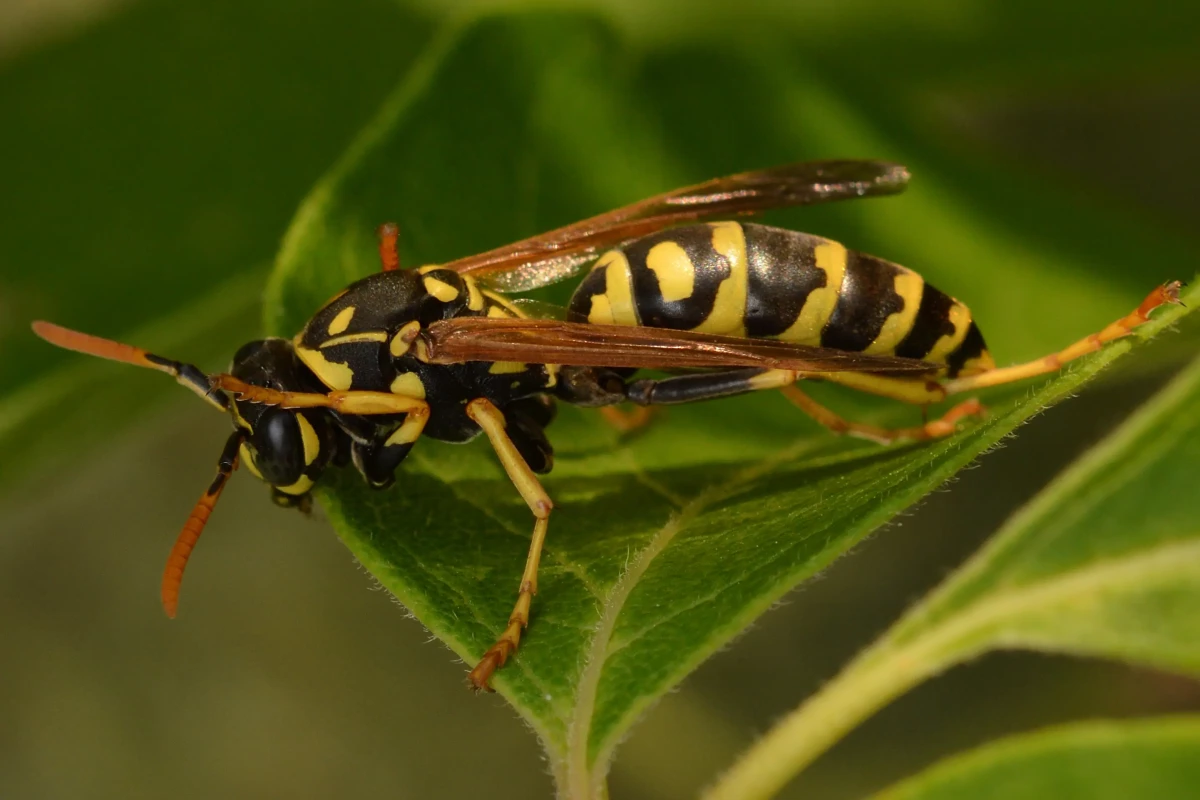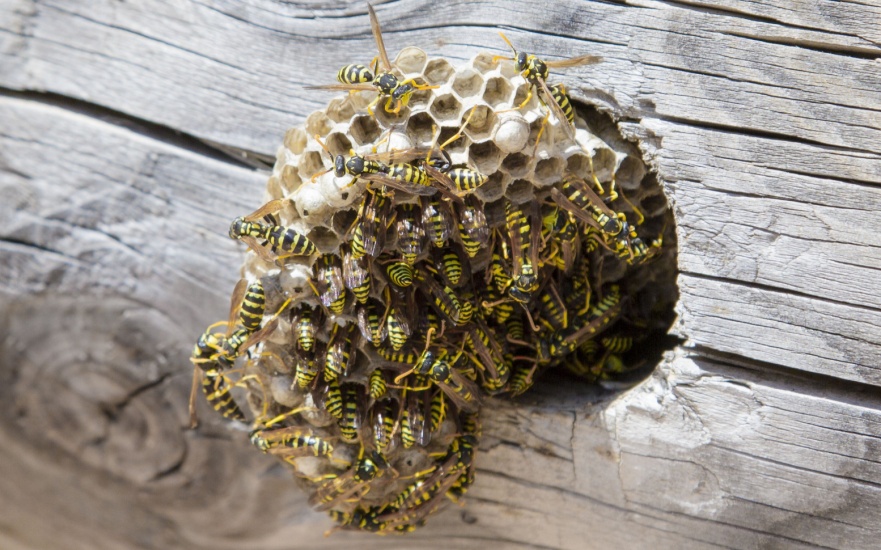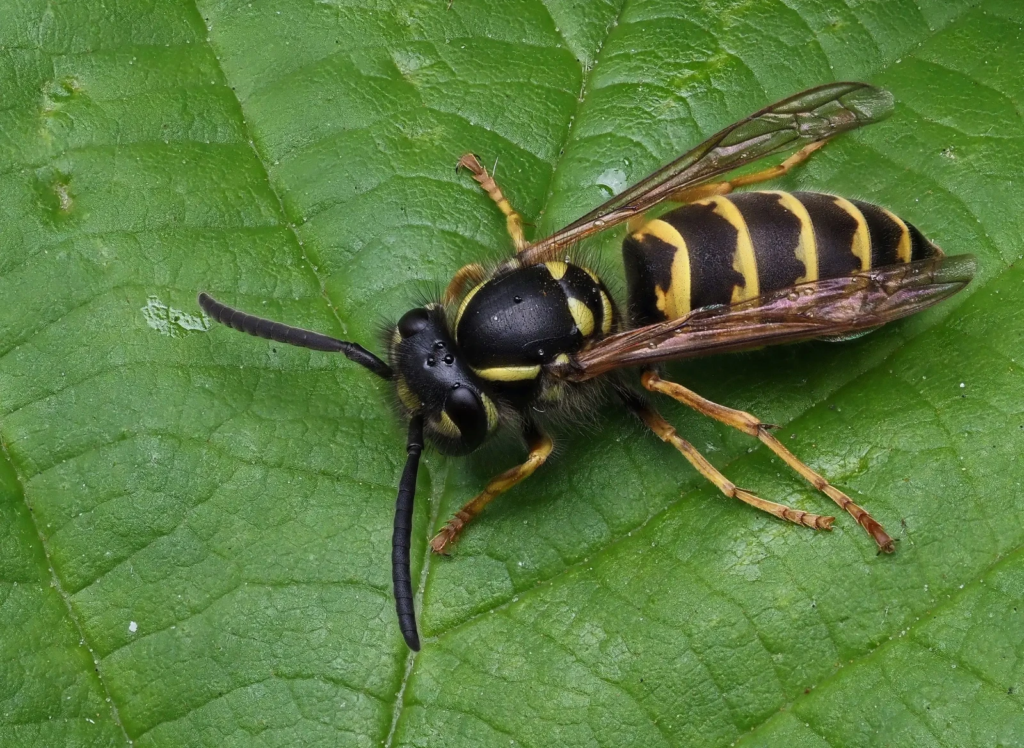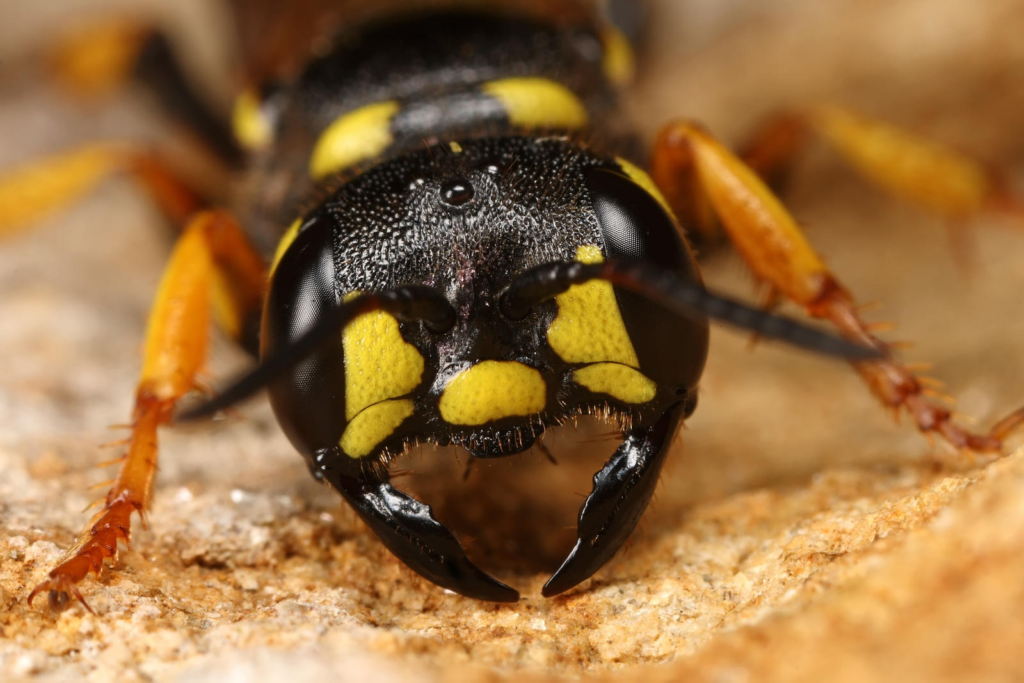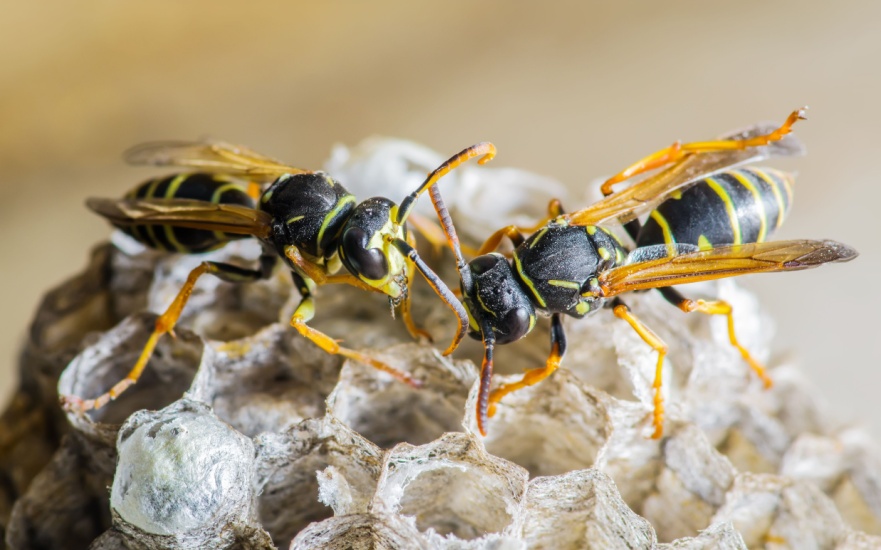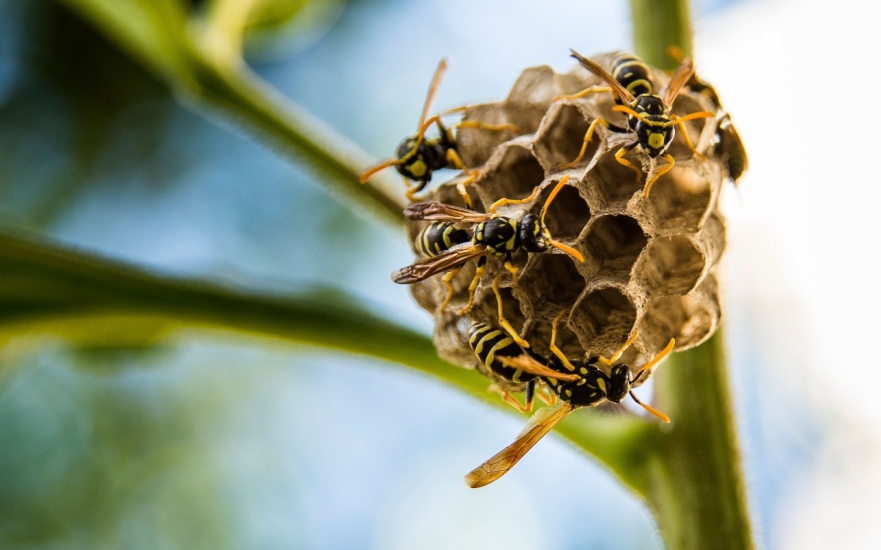Why Do I Have So Many Wasps in My Yard?
Wasps in your yard can be scary. You might wonder why they’re there. At Vinx Pest Control, we get it. We’re here to help you figure it out.
Wasps like certain places and things. Your yard might be perfect for them. Things like food, shelter, and plants can attract wasps. For more tips on dealing with wasps, check out our guide on effective wasp control tips.
Key Takeaways
- Wasps are attracted to food sources like uncovered food and sugary drinks.
- Sheltered areas such as decks and patios can be ideal for wasp nests.
- Certain plants and outdoor lights can also attract wasps.
- Effective wasp control involves identifying and removing attractants.
- Professional pest control services can help manage severe wasp infestations.
The Sudden Surge of Wasps: Why Your Yard Becomes a Hotspot
Wasps like certain things in your yard. Knowing what they like helps figure out why you have wasps. Many things can make your yard a favorite spot for wasps.
Environmental Factors That Attract Wasps
Wasps love food, water, and places to hide. Sweet flowers, standing water, and messy gardens draw them in. Also, yards near food or pet food outside can attract wasps.
How Weather Patterns Affect Wasp Activity
Weather affects wasps a lot. Warm and sunny days make them buzz around more. Rain and cool days make them slow down. Knowing this helps you get ready for wasps.
Common Types of Wasps Invading American Yards
Knowing the different wasps in American yards helps manage pests. Homeowners can tackle infestations by knowing the common wasp species.
Yellow Jackets: The Ground-Nesting Aggressors
Yellow jackets are very aggressive, mainly when their nests are threatened. They nest in the ground, causing problems for homeowners. They love sweet things and proteins, which leads them to outdoor food and gatherings.
Paper Wasps: Builders of Umbrella-Shaped Nests
Paper wasps have umbrella-shaped nests under eaves or in trees. They are less aggressive but will defend their homes. They help control pests by eating insects.
Bald-Faced Hornets: The Large Aerial Nest Constructors
Bald-faced hornets build big nests in trees or on buildings. They are defensive but help control pests by eating other insects.
Mud Daubers: The Solitary Pipe Builders
Mud daubers build their nests out of mud, looking like tubes. They are not aggressive and help by eating spiders and other insects. They don’t form big colonies, so they’re less of a problem.
Knowing about these wasps helps homeowners manage infestations and avoid stings.
Understanding the Wasp Life Cycle and Seasonal Patterns
To manage wasp problems, knowing their life cycle and seasonal changes is key. Wasps, like many insects, have a complex life cycle. This is influenced by the environment and the seasons.
Spring: Queen Emergence and Colony Foundation
In spring, queen wasps come out from their winter hideouts. They look for places to start new colonies. They build small nests where they lay eggs that will become the first workers.
Summer: Worker Production and Nest Expansion
In summer, the queen’s workers grow the nest. They find food and take care of the young. This is a time to control wasps, as stopping the colony’s growth can reduce the number later.
Fall: Reproductive Phase and Increased Aggression
In fall, the colony focuses on making new queens and males. These leave to mate, and new queens find places to winter. The colony gets more aggressive as food runs out. Knowing this can help prevent problems. For more on wasp control, visit Vinx Pest Control’s guide on getting rid of wasps.
What Attracts Wasps to Your Yard?
Wasps like yards with lots of food, water, and places to hide. Knowing what they like helps us keep them away.
Food Sources: Sweets, Proteins, and Garden Pests
Wasps love sweet things like soda and fruit. They also eat insects and pet food outside. Gardens full of pests attract them too.
To keep wasps away, clean up your yard. Throw away trash and control pests. For tips, visit Vinx Pest Control.
Water Features and Moisture Problems
Wasps need water for drinking and cooling their nests. Ponds, bird baths, and pet dishes attract them. Moisture issues like clogged drains also draw wasps.
Fixing drainage and leaks helps keep wasps away. This makes your yard less appealing to them.
Ideal Nesting Locations Around Your Home
Wasps nest in safe spots like eaves and attics. They also nest underground, like yellow jackets in old burrows. Knowing where they like to nest helps us prevent them.
How to Identify Wasp Nests Before They Become Problematic
Knowing where wasps nest helps you avoid their stings. They nest in many places, like underground, in the air, and inside homes. Spotting these nests early stops wasp problems.
Underground Nests: Spotting Yellow Jacket Colonies
Yellow jackets nest underground in old rodent holes or hidden spots. Look for wasps flying in and out of small ground holes. Also, watch for more wasps near food or sweet things near the nest.
Aerial Nests: Eaves, Trees, and Outdoor Structures
Paper wasps and bald-faced hornets make nests in the air. Their nests look like umbrellas and hang from eaves or trees. Check these spots often, mainly in spring and summer. For more on wasp issues, visit Vinx Pest Control.
Indoor Nests: Attics, Wall Voids, and Crawl Spaces
Wasps can nest inside, like in attics or crawl spaces. Look for wasps going in and out of small spots, like vents. Check these places well, as nests can be hidden. Finding them early stops them from growing and causing big problems.
The Surprising Benefits of Wasps in Your Ecosystem
Wasps are not just stinging insects; they are also valuable allies in maintaining a balanced ecosystem. At Vinx Pest Control, we recognize the importance of understanding the role wasps play in our environment. By appreciating their benefits, we can better manage their presence in our yards.
Natural Pest Controllers: How Wasps Manage Garden Pests
Wasps are natural pest controllers. They feed on insects that can damage gardens and crops. They prey on aphids, flies, and caterpillars, helping to regulate pest populations without the need for pesticides.
This biological control is essential for maintaining healthy gardens and ecosystems.
Pollination Services: The Overlooked Role of Wasps
In addition to controlling pests, wasps also contribute to pollination services. Like bees, wasps visit flowers in search of nectar. They inadvertently transfer pollen between plants.
While their role in pollination is often overlooked, it is significant. It is important for certain plant species.
Health Risks of Wasp Infestations: When to Be Concerned
Wasp stings can be a big problem. They can hurt a lot, and some people can have serious reactions. This is true for those who are allergic to wasp venom.
Anatomy of a Wasp Sting: Venom and Reactions
A wasp sting puts venom into your skin. This can make you feel pain, swell, and get red where you were stung.
Allergic Reactions: Symptoms and Emergency Response
Some people get allergic to wasp stings. This can make them feel itchy, swell, and have trouble breathing. If it gets really bad, they might need to see a doctor right away.
Multiple Stings: Cumulative Venom Effects
Getting stung more than once can be worse. More venom means more problems. This can hurt your kidneys and make it hard to breathe.
If you feel weird after a wasp sting, get help fast. Vinx Pest Control wants to help you deal with wasps safely.
DIY Wasp Prevention Strategies for Your Yard
Preventing wasps can save you from trouble. Simple DIY steps can keep wasps away. These methods make your yard less inviting to wasps and stop them from nesting.
Landscape Modifications That Deter Wasps
Changing your yard’s look can keep wasps away. Cut your grass and remove weeds. This makes your yard less attractive to wasps.
Also, clean up debris where wasps might nest. Plant mint, basil, or lemongrass around your yard. These plants repel wasps.
Effective Natural Repellents and Deterrents
Some natural things can keep wasps away. Peppermint, eucalyptus, and citronella oils work well. Mix these oils with water and spray them around.
Or, use them in a diffuser. Planting herbs and flowers that repel wasps is also good. It looks nice and keeps wasps away.
Homemade Wasp Traps: Designs and Placement
Homemade wasp traps can catch and remove wasps. You can make one with a jar, sweet liquid bait, and a funnel. Put the trap where wasps are seen, but hang it 10 feet up.
Sealing Entry Points Around Your Home
Sealing your home keeps wasps out. Check your home’s outside for gaps or holes. Use caulk or sealant to block these.
Also, think about adding door sweeps or weatherstripping. This stops wasps from getting in.
Safe Techniques for Removing Wasp Nests
Before you try to remove a wasp nest, know the risks. It’s dangerous if you don’t do it right. You could get hurt by wasps.
Essential Protective Equipment for DIY Removal
Wear the right gear to protect yourself. This includes a beekeeping suit, gloves, and a veil. Make sure your clothes cover your wrists and ankles well.
Optimal Timing for Nest Removal Operations
The best time to remove a nest is at night. Wasps are less active then. Don’t do it during the day or when it’s warm.
Step-by-Step Removal Process for Different Nest Types
How you remove a nest depends on its type. For underground nests, use dust or foam insecticide. For aerial nests, spray insecticide and have a way to get away.
Post-Removal Precautions and Area Treatment
Check the area after removing the nest. Make sure no wasps are left. Clean it with soap and water to remove pheromones. You might need to use insecticide to keep wasps away.
When to Call Vinx Pest Control for Professional Wasp Management
Vinx Pest Control is your best choice for wasp problems. But when should you call them? DIY methods work for small issues. But for big problems, you need a pro.
Warning Signs That Require Professional Intervention
Call Vinx Pest Control if you see these signs: lots of wasp nests, wasps acting mean, or nests in tricky spots. Also, if someone in your home is allergic to wasp stings, get help fast.
Vinx Pest Control’s Wasp Treatment Process
Vinx Pest Control starts with a detailed check to find all wasp nests. Then, they make a special plan to get rid of the wasps. They use safe methods and special tools to keep wasps away.
Long-Term Prevention Plans for Persistent Wasp Problems
For places that always get wasps, Vinx Pest Control has long-term plans. They check often, seal up holes, and use special treatments to keep wasps away. With Vinx Pest Control, your outdoor space will be wasp-free all year.
Debunking Common Myths About Wasps and Their Control
Wasps are often misunderstood. This can lead to bad ways to manage them. At Vinx Pest Control, we want to clear up these myths. This helps homeowners deal with wasp problems better.
Behavioral Misconceptions That Lead to Poor Management
Many think all wasps are aggressive. But most wasps are not unless their nests are threatened. Knowing how wasps act is key to managing them well.
Wasps are drawn to sweet things. So, don’t leave soda or fruit outside. This helps avoid attracting wasps.
Some think wasps are pests with no use. But wasps help control pests and pollinate plants. Seeing their value can lead to better ways to manage them.
Ineffective DIY Methods That Waste Time and Money
DIY methods like soap and water or commercial traps might seem helpful. But they often don’t solve the problem. For example, traps alone don’t stop new wasps from coming.
At Vinx Pest Control, we suggest a better plan. This includes finding and removing nests, sealing holes, and using deterrents. This way, you get lasting relief from wasps.
Conclusion: Creating a Balanced Approach to Wasp Management
Managing wasps well is key. Knowing how they act, live, and what they like helps a lot. Homeowners can stop wasps from coming in by sealing holes and getting rid of food they like.
For natural ways to keep wasps away, try using things like cinnamon or vinegar. If wasps are a big problem, Vinx Pest Control can help. They know how to deal with wasps.
Managing wasps means stopping them before they start, knowing who they are, and treating them when needed. A good plan keeps everyone safe outside. Vinx Pest Control helps make your outdoor area safe and fun again.
FAQ
Q: What are the most common types of wasps found in American yards?
A: In American yards, you’ll often see yellow jackets, paper wasps, bald-faced hornets, and mud daubers. Each has its own look and ways of acting.
Q: Why are wasps attracted to my yard?
A: Wasps like yards with food like sweets and proteins. They also like water and places to nest near homes.
Q: How can I identify a wasp nest before it becomes problematic?
A: Look for underground nests or nests in trees or buildings. Also, check for nests in attics or wall spaces. Different wasps make different kinds of nests.
Q: Are wasps beneficial to the ecosystem?
A: Yes, wasps help by controlling pests and pollinating plants. But, people often don’t notice their good work.
Q: What are the health risks associated with wasp infestations?
A: Wasp stings can cause allergic reactions and serious problems. Getting stung many times can be very dangerous.
Q: How can I prevent wasp infestations in my yard?
A: Change your yard to keep wasps away. Use natural repellents and make traps. Also, seal up your home.
Q: How do I safely remove a wasp nest?
A: Wear protective gear and pick the right time. Follow steps for each nest type. And be careful after you remove it.
Q: When should I call a professional for wasp management?
A: Call a pro like Vinx Pest Control if you see big or mean wasp groups. Or if you need help keeping them away for good.
Q: What are some common myths about wasps and their control?
A: Many people think wrong things about wasps. This leads to bad ways to deal with them. Knowing the truth helps control them better.
Q: Can wasps be a sign of a larger pest control issue?
A: Yes, wasps might come because of other pests. This means you might have a bigger problem that needs fixing.
Q: How do weather patterns affect wasp activity?
A: Weather, like temperature and rain, changes how active wasps are. Some weather makes them more active or mean.


